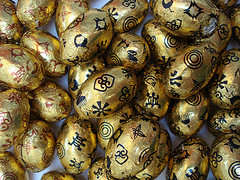If you leave your Easter egg shopping to the last minute, you must expect to have to hunt around for the best eggs, particularly if you are after Fairtrade Easter Eggs. Oxfam stores are always a good bet, but then, that’s where everyone else is looking for their Fairtrade chocolate too, so this close to Easter you might be in for a rude awakening.
However, there is good news. This year there are a few more options, at least in Australia. The big one is the Cadbury dairy milk Fairtrade Easter egg. This is a big deal because Cadbury are such a big company, with such a large market share, that even though they are only doing one kind of basic Fairtrade milk chocolate egg, it makes a big difference to the sheer quantity of Fairtrade eggs available.
But they are not the only ones. Chocolatier, which is the brand Oxfam has for sale, make 100g milk or dark chocolate Easter eggs, while Lindsay & Edmunds produce 150g eggs, in white, milk and dark Fairtrade organic Belgian chocolate, though these are not widely available.
In Australia Fairtrade Easter eggs of one brand or another are (or were) available from Oxfam, Myer, David Jones, Target, Big W, IGA, Priceline, the Trading Circle, Chocolatier stores, and Agora Organic Market, Templestowe (for Lindsay & Edmunds eggs), as well as online from oxfamshop.org.au and lindsayandedmunds.com.au.
On the downside, most of the Easter eggs sold in Australia (and around the world) this year, still involve child labour and trafficked labour in their production. Between 2009 and 2010 public recognition of the Fairtrade label rose from 23 per cent 37 per cent in Australia, but compare this with 50 per cent in New Zealand and 74 per cent in Britain, and more importantly, with the 50 to 55 per cent Cadbury brand director Simon Talbot says it needs to be in order to get the momentum going so that other chocolate producers will come on board.
The World Vision Report Our guilty pleasure: exploitative child labour in the chocolate industry release this week recommends a ‘sustainability levy’ on cocoa, claiming that ‘if Australian chocolate companies paid a small levy of 2 cents in every $10 of chocolate sales, exploitative child and trafficked labour in the cocoa industry could be abolished’.
Sources: The Age, World Vision
Healthy Family | Healthy World



